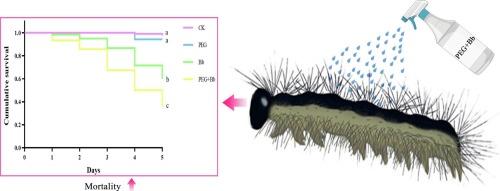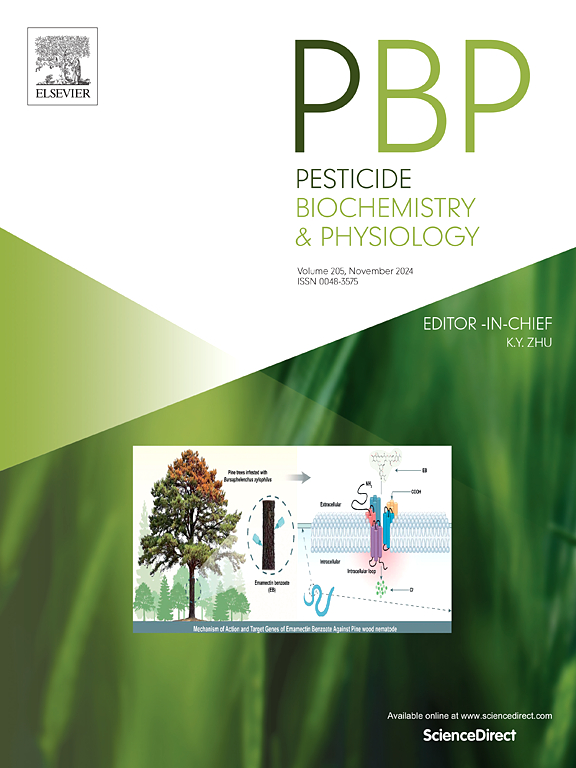The synergistic potential of polyethylene glycol 400 for the control of Hyphantria cunea larvae by Beauveria bassiana
IF 4.2
1区 农林科学
Q2 BIOCHEMISTRY & MOLECULAR BIOLOGY
引用次数: 0
Abstract
The efficacy of entomopathogenic fungi as pest control agents is constrained by both their physiological state and external environmental factors. This study identified synergists capable of enhancing the insecticidal activity of Beauveria bassiana (Bb) and investigated the underlying synergistic mechanisms. Our results found that among 6 potential synergists, polyethylene glycol 400 (PEG) and trehalose significantly improved Bb's lethality against Hyphantria cunea larvae, with PEG demonstrating the most pronounced effect. PEG treatment markedly increased Bb spore adhesion and germination rates, while spore hydrophobicity and growth rates remained unaffected. Moreover, PEG-treated spores exhibited higher thermal tolerance compared to untreated ones. In the Bb + PEG treatment group, the hemocyte count, encapsulation and melanization activities, and the expression of related regulatory genes were significantly lower than those in the Bb treatment group. Additionally, pathogen recognition, signal transduction, and humoral immunity effector genes expression were markedly suppressed in the Bb + PEG group. A significant reduction in the content of total amino acids, free fatty acids, glucose, and trehalose, alongside decreased expression of key regulatory genes in the tricarboxylic acid cycle and glycolysis pathways, was observed in the Bb + PEG treatment group. Furthermore, PEG enhanced Bb-induced apoptosis in H. cunea larvae, as evidenced by the upregulation of apoptosis-related genes. Notably, PEG alone did not significantly impact the innate immunity, energy metabolism, or apoptosis in H. cunea larvae. Overall, PEG exhibits considerable potential in amplifying Bb's insecticidal activity by directly optimizing spore performance and indirectly modulating the larvae's innate immunity, energy metabolism, and apoptosis.

聚乙二醇 400 对巴氏杆菌控制胭脂虫幼虫的增效潜力
昆虫病原真菌作为害虫控制剂的功效受到其生理状态和外部环境因素的制约。本研究发现了能够增强 Beauveria bassiana(Bb)杀虫活性的增效剂,并研究了其潜在的增效机制。我们的研究结果发现,在 6 种潜在的增效剂中,聚乙二醇 400(PEG)和曲哈糖能显著提高 Bb 对 Hyphantria cunea 幼虫的致死率,其中 PEG 的效果最为明显。PEG 处理明显提高了 Bb 孢子的附着力和发芽率,而孢子的疏水性和生长率则不受影响。此外,与未经处理的孢子相比,经 PEG 处理的孢子具有更高的耐热性。在 Bb + PEG 处理组中,血球数、封装和黑色化活性以及相关调控基因的表达量明显低于 Bb 处理组。此外,病原体识别、信号转导和体液免疫效应基因的表达在 Bb + PEG 组受到明显抑制。在 Bb + PEG 处理组中观察到总氨基酸、游离脂肪酸、葡萄糖和三卤糖的含量明显降低,同时三羧酸循环和糖酵解途径中的关键调控基因的表达也有所下降。此外,PEG 还增强了 Bb 诱导的楔尾蛙幼虫凋亡,凋亡相关基因的上调证明了这一点。值得注意的是,单独使用 PEG 并不会对楔尾蛙幼虫的先天免疫、能量代谢或细胞凋亡产生显著影响。总之,PEG 通过直接优化孢子性能和间接调节幼虫的先天免疫、能量代谢和细胞凋亡,在增强 Bb 的杀虫活性方面具有相当大的潜力。
本文章由计算机程序翻译,如有差异,请以英文原文为准。
求助全文
约1分钟内获得全文
求助全文
来源期刊
CiteScore
7.00
自引率
8.50%
发文量
238
审稿时长
4.2 months
期刊介绍:
Pesticide Biochemistry and Physiology publishes original scientific articles pertaining to the mode of action of plant protection agents such as insecticides, fungicides, herbicides, and similar compounds, including nonlethal pest control agents, biosynthesis of pheromones, hormones, and plant resistance agents. Manuscripts may include a biochemical, physiological, or molecular study for an understanding of comparative toxicology or selective toxicity of both target and nontarget organisms. Particular interest will be given to studies on the molecular biology of pest control, toxicology, and pesticide resistance.
Research Areas Emphasized Include the Biochemistry and Physiology of:
• Comparative toxicity
• Mode of action
• Pathophysiology
• Plant growth regulators
• Resistance
• Other effects of pesticides on both parasites and hosts.

 求助内容:
求助内容: 应助结果提醒方式:
应助结果提醒方式:


